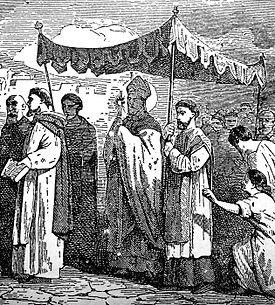- Mamertus
-
Saint Mamertus
An engraving of Saint Mamertus from an 1878 book, Little Pictorial Lives of the SaintsDied c. AD 475
Arles, present-day FranceHonored in Roman Catholic Church Feast May 11 Saint Mamertus (died c. 475) was the Archbishop of Vienne in Gaul and is a saint in the Roman Catholic Church. His primary contribution to ecclesiastical practice was the introduction of litanies prior to Ascension Day as an intercession against earthquakes and other disasters, leading to "Rogation Days." His feast day is the first of the Ice Saints.
Life
Prior to his elevation to the see of Vienne, little has been recorded about Mamertus' life. The fact that his brother, Claudianus Mamertus, the theological writer, received in his youth a sound training in rhetoric, and enjoyed the personal acquaintance of Bishop Eucherius of Lyons (434-50), suggests that the brothers belonged to a wealthy Gallic family from the neighbourhood of Lyons. Like his brother, St Mamertus was distinguished for his secular learning as well as theology, and, before his elevation to the episcopate, appears to have been married.
His election and consecration took place shortly before 462. As bishop he enlisted the services of his brother, who had withdrawn to a cloister, and ordained him priest of Vienne. The activity of the brothers is described in one letter of Sidonius Apollinaris[1], while another is addressed to Bishop Mamertus.[2]
In 463, Mamertus was engaged in a dispute with Pope Hilarius on the question of the privileges of the Bishop of Arles. Pope Leo I had regulated the boundaries of the ecclesiastical provinces of Arles and Vienne: under the latter he left the Dioceses of Valence, Tarentaise, Geneva and Grenoble, but all the other dioceses in this district were made subordinate to Arles. Regardless of this decision and infringing on the rights of his colleague of Arles, Mamertus consecrated in 463 a bishop for the city of Die (Dea). King Gundioc of the Burgundians complained to Pope Hilary of this action, whereupon the latter wrote to Bishop Leontius of Arles on 10 October 463, bidding him summon a synod of bishops from the different provinces to enquire into the matter. In a subsequent letter to the bishops of the Roman provinces of Lyons, Vienne, Narbonnensis I and II and Alpina, he also refers to the matter, and directs them to obey Leontius's summons to a regularly constituted synod.[3] The synod decided against Mamertus, as we learn from another letter of the pope dated 25 February, 464.[4] In this letter, St Hilary declares that Mamertus and the bishop unlawfully consecrated by him should really be deposed; desiring, however that clemency be used, he commissioned Bishop Veranus to inform Mamertus that, if he did not recognize and submit to the regulations of Pope Leo, he would be deprived also of the four suffragan dioceses, still subject to Vienne. The bishop invalidly installed by Mamertus was to be confirmed in his office by Leontius, after which he might retain the bishopric. Mamertus evidently submitted, since we find no subsequent reference to the incident.
During his episcopate, the remains of St. Ferreolus were discovered, and were translated by Mamertus to a church in Vienne, built in honour of that martyr.[5] St. Mamertus was the founder of the Rogation Processions, according to Sidonius Apollinaris,[6] and his second successor, Avitus[7] In connexion with these intercessory processions, Mamertus summoned a synod at Vienne between 471 and 475. About 475 he attended a synod at Arles, which dealt with the predestination teaching of Lucidus, a Gallic priest. As this is the latest information we possess concerning him, we may assume that he died shortly afterwards.
Veneration
After his death he was venerated as a saint. Saint Mamertus' name stands in the Martyrologium Hieronymianum and in the Martyrologium of Florus of Lyons under May 11, on which day his liturgical feast day is still celebrated (Henri Quentin, Les martyrologes historiques, 348) in the Roman Catholic Church.
References
- ^ Sidonius, Epist., IV, xi
- ^ Epist., VII, 1
- ^ Thiel, "Epist. Rom. Pont.", I, cxlvi, cli; Jaffé, "Regesta Rom. Pont.", I, 2nd ed., dlvi, dlix
- ^ Thiel, op. cit., I, cxlviii; Jaffé, op. cit., I, dlvii
- ^ Gregory of Tours, "De gloria mart.", II, ii
- ^ Sidonius, Epist., V, xiv; VII, i
- ^ "Homilia de Rogat." in P. L., LIX, 289-94
- "Saint Mamertus". Catholic Encyclopedia. New York: Robert Appleton Company. 1913. http://www.newadvent.org/cathen/09580a.htm.
 This article incorporates text from a publication now in the public domain: Herbermann, Charles, ed (1913). Catholic Encyclopedia. Robert Appleton Company.Categories:
This article incorporates text from a publication now in the public domain: Herbermann, Charles, ed (1913). Catholic Encyclopedia. Robert Appleton Company.Categories:- 5th-century births
- 470s deaths
- Bishops in Gaul
- Archbishops of Vienne
- 5th-century archbishops
- 5th-century Christian saints
- Gallo-Roman saints
Wikimedia Foundation. 2010.

